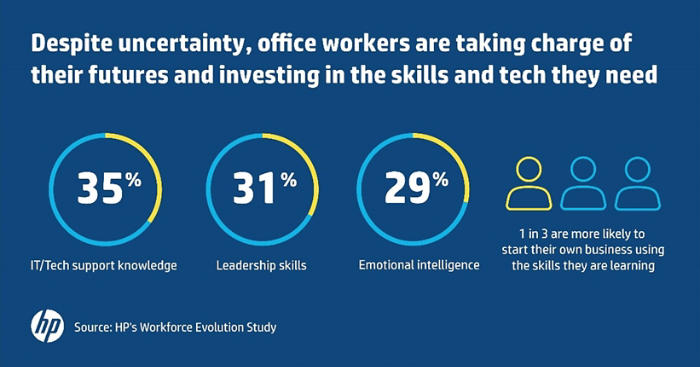As the pandemic accelerates workforce innovation, employees are prioritizing the pursuit of personal passions, reskilling and retraining themselves for the future of work
HP Inc. (NYSE: HPQ) today released the results of its HP Workforce Evolution Study (WES) that reveals how the acceleration of digitization and remote work caused by the COVID-19 pandemic has heightened the need for reskilling, with 6 in 10 office workers in the U.S. and Europe agreeing that lifelong learning is now more important than ever before.
In the face of decreased job security, HP’s study identifies a new trend in the rise of the “Empowered Employee” – office workers who are retraining themselves with the skills needed to succeed beyond their current roles and for the future of work. More than 40% are doing so through online programs, like HP LIFE — an HP Foundation program offering free, skills-training for entrepreneurs, business owners, and lifelong learners all over the world — that has seen an impressive 282% growth in signups compared to the same period in 2019.
With 35% of employees surveyed more likely to start their own companies with the new skills they gain, HP’s survey also examines what actions employers must take to ensure they are providing employees with the support, equipment, training and flexibility required to attract and retain top talent.
“The past few months have accelerated the future of work. Everyone has been affected — from the world’s most powerful organizations to small businesses and individuals,” says Tracy Keogh, Chief Human Resources Officer at HP and co-chair of the World Economic Forum’s task force for the Future of Work. “It is more important than ever to not only invest in the latest technology but also invest in the skills of our workforce. The strength and agility of our people will be what continues to propel us forward.”
These trends are not exclusive to the United States and Europe. Another report HP commissioned earlier this year — The HP Asia SMB Report 2020 — found that SMBs in Asia also realize the important of innovating the way people work and investing in digital-first skills to maintain growth post-COVID.









